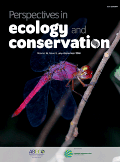
Perspectives in Ecology and Conservation
Scope & Guideline
Fostering knowledge exchange in the realm of ecology and conservation.
Introduction
Aims and Scopes
- Biodiversity Conservation Strategies:
The journal publishes studies that explore innovative conservation strategies, including the integration of indigenous knowledge, community engagement, and sustainable practices to enhance biodiversity preservation. - Ecological Impact Assessments:
Research focusing on assessing the ecological impacts of human activities such as agriculture, urbanization, and climate change on various ecosystems, aiming to inform conservation policies and practices. - Ecosystem Services and Functionality:
Papers addressing the role of ecosystems in providing essential services, including carbon storage, water purification, and habitat provision, highlighting the importance of maintaining ecological integrity. - Climate Change and Adaptation:
The journal emphasizes research on the implications of climate change for biodiversity and ecosystem functionality, exploring adaptive strategies to mitigate negative impacts. - Restoration Ecology:
A focus on ecological restoration practices, including the methodologies for restoring degraded ecosystems and enhancing connectivity between fragmented habitats.
Trending and Emerging
- Community-Based Conservation:
An increasing emphasis on community-driven conservation efforts that integrate local knowledge and participation, recognizing the role of communities in biodiversity stewardship. - Climate Resilience and Adaptation Research:
A notable rise in studies focusing on the resilience of ecosystems and species in the face of climate change, exploring adaptive strategies and mitigation measures. - Multi-Scale Conservation Approaches:
Emerging themes emphasize the need for multi-scalar approaches that address conservation across different geographical and ecological scales, promoting connectivity and landscape-level planning. - Impact of Anthropogenic Factors on Biodiversity:
Growing attention is being paid to the effects of urbanization, agriculture, and infrastructure development on biodiversity, leading to research that informs more sustainable land-use practices. - Integrative Frameworks for Biodiversity and Ecosystem Services:
A trend towards integrating biodiversity conservation with ecosystem service assessments, highlighting the interconnectedness of ecological health and human well-being.
Declining or Waning
- Traditional Species-Centric Approaches:
There has been a noticeable decline in papers that focus solely on individual species conservation without considering broader ecological contexts or community dynamics. - Ex Situ Conservation Strategies:
Research on ex situ conservation methods appears to be waning, as the focus shifts towards in situ conservation efforts that prioritize habitat protection and restoration. - Overemphasis on Deforestation Studies:
While still relevant, the frequency of studies solely focused on deforestation metrics has decreased, as researchers increasingly address holistic approaches that incorporate socio-economic factors and land-use planning. - Focus on Historical Baselines:
There is a declining trend in papers that emphasize historical baselines for ecological restoration, as contemporary frameworks prioritize adaptive management and resilience in rapidly changing environments.
Similar Journals

WETLANDS ECOLOGY AND MANAGEMENT
Illuminating the dynamics of aquatic ecosystems for a sustainable future.Wetlands Ecology and Management, published by Springer, is an esteemed journal that has been advancing the field of wetland studies since its inception in 1982. Operating under the ISSN 0923-4861 and E-ISSN 1572-9834, this journal is headquartered in the Netherlands and serves as a critical resource for researchers, professionals, and students alike. It fosters interdisciplinary dialogue among aquatic science, ecology, and resource management disciplines, ranking in the Q2 category for Aquatic Science and Ecology, Evolution, Behavior and Systematics as of 2023. With a notable Scopus ranking, it is positioned favorably within the 65th percentile in Ecology and a commendable 58th percentile in Aquatic Sciences. The journal emphasizes the importance of effective management strategies and policies in the conservation of wetlands, making it indispensable for those aiming to drive impactful research. Although it is not an open-access journal, its high-quality publications remain accessible through library consortia and institutional subscriptions, ensuring that pertinent insights into the ecological dynamics and sustainable management practices are available to the global research community.
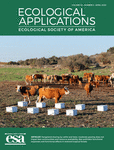
ECOLOGICAL APPLICATIONS
Unveiling the complexities of ecological systems.ECOLOGICAL APPLICATIONS, published by WILEY, is a leading journal in the field of ecology, providing a platform for innovative research that addresses the understanding and management of ecological systems. With an ISSN of 1051-0761 and E-ISSN of 1939-5582, it has established itself as a vital resource for ecologists and environmental scientists since its inception in 1991. Ranked in the top quartile (Q1) for Ecology in 2023 and with a Scopus ranking of 40 out of 461 in Environmental Science, ECOLOGICAL APPLICATIONS boasts an impressive impact factor, attesting to its significance and influence in the field. The journal's mission is to publish peer-reviewed articles that contribute to ecological theory and its applications in conservation and environmental management. Researchers, professionals, and students alike will find invaluable insights and the latest developments in ecological research through its comprehensive scope and rigorous scholarship, ensuring a crucial role in shaping future ecological practices and policies.
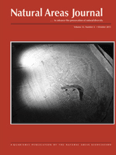
NATURAL AREAS JOURNAL
Bridging Research and Practice in Nature ConservationNATURAL AREAS JOURNAL, published by the NATURAL AREAS ASSOCIATION, serves as a vital resource for scholars and practitioners in the fields of ecology and nature conservation. Since its inception in 1993, this quarterly academic journal delivers original research, case studies, and reviews that focus on the preservation of natural areas and the intricate relationships within ecosystems. The journal, indexed under ISSN 0885-8608 and E-ISSN 2162-4399, currently holds a Q3 quartile ranking in both Ecology and Nature and Landscape Conservation as of 2023, reflecting its commitment to advancing knowledge in these essential areas. With Scopus rankings placing it at the 39th percentile in Nature and Landscape Conservation and 36th in Ecology, the NATURAL AREAS JOURNAL is an influential platform that fosters interdisciplinary collaboration and advocacy for conservation efforts. Although it currently does not offer Open Access options, its contributions are pivotal for researchers, professionals, and students seeking to explore, understand, and contribute to conservation science.

Floresta e Ambiente
Connecting researchers to promote sustainable forest management.Floresta e Ambiente is a pioneering open-access journal dedicated to advancing knowledge in forestry and environmental science, published by the Federal Rural University of Rio de Janeiro's Institute of Forests. Since its inception in 2012, this journal has emerged as a crucial platform for researchers, professionals, and students to disseminate innovative findings and foster discussions on sustainable forest management, conservation practices, and the ecological significance of forests in Brazil and beyond. With an impressive impact factor and a commendable ranking in the SCOPUS database, positioned in the 49th percentile of the Agricultural and Biological Sciences category, Floresta e Ambiente actively supports the dissemination of high-quality research while contributing to the global discourse on forestry. As an open access journal since 2013, it ensures that valuable knowledge is readily available to all, enhancing collaboration and engagement within the scientific community.
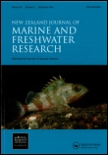
NEW ZEALAND JOURNAL OF MARINE AND FRESHWATER RESEARCH
Exploring the Depths of Aquatic ScienceNEW ZEALAND JOURNAL OF MARINE AND FRESHWATER RESEARCH, published by Taylor & Francis Ltd, stands as a distinguished platform for the dissemination of innovative research in the realms of aquatic science and ecology. With an ISSN of 0028-8330 and E-ISSN 1175-8805, this journal has been curating significant scientific contributions since its inception in 1967, continuing through to 2024. Recognized in the Q2 category across multiple relevant fields—including Aquatic Science, Ecology, and Water Science—this journal ranks notably in Scopus, with a 74th percentile for Ecology, Evolution, Behavior and Systematics, highlighting its impact and relevance within the scientific community. Though not an open-access publication, its rigorous peer-reviewed articles offer insights that resonate with researchers, professionals, and students who are passionate about advancing our understanding of freshwater and marine ecosystems. By fostering a collaborative space for ecological and environmental inquiries, the NEW ZEALAND JOURNAL OF MARINE AND FRESHWATER RESEARCH is essential for those aiming to contribute to the vital conversations around biodiversity, conservation, and sustainable management of aquatic resources.

NORTHWEST SCIENCE
Unveiling the complexities of nature through rigorous research.NORTHWEST SCIENCE, published by the NORTHWEST SCIENTIFIC ASSOCIATION, serves as a vital resource for researchers and professionals in the fields of ecology, evolution, and systematics. With an ISSN of 0029-344X and an E-ISSN of 2161-9859, this journal has been disseminating valuable scientific insights since its inception in 1975 and continues to do so into 2024. Although currently positioned in the Q4 quartile for its category, it plays a crucial role in advancing the understanding of ecological and biological sciences, reflecting a diverse range of studies and methodologies. Researchers will find the journal particularly appealing due to its emphasis on regional studies and their implications on a global scale. While NORTHWEST SCIENCE is not an open-access publication, it provides significant contributions to the academic dialogue within its discipline, making it an essential addition to the library of any dedicated researcher, student, or professional in the environmental sciences.
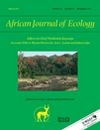
AFRICAN JOURNAL OF ECOLOGY
Advancing Knowledge in Ecology and ConservationThe African Journal of Ecology, published by Wiley, is a leading academic journal in the field of Ecology, Evolution, Behavior, and Systematics. Established in 1963 and continuing its vital contributions to the field until 2024, this journal serves as a premier platform for researchers and scholars to share groundbreaking studies that explore the intricate relationships within ecosystems, particularly in the African context. With an impressive Scopus Rank of #423 out of 721 and a Q3 Quartile ranking, it stands as a credible source of scholarly information, gaining recognition among peers for its rigorous peer-review process and impactful publications. While the journal is not open access, it remains influential in driving advancements in ecological research and providing insights vital for conservation efforts and biodiversity studies. Authors and readers alike will find that the African Journal of Ecology not only promotes scientific inquiry but also fosters a deeper understanding of ecological dynamics that affect our world.

TROPICAL ECOLOGY
Fostering Sustainable Solutions for Tropical EnvironmentsTropical Ecology is a distinguished journal published by SpringerNature that has been at the forefront of advancing the field of ecology since its inception. With a focus on tropical ecosystems, it addresses critical areas such as conservation biology, systematics, and environmental science. The journal is indexed within leading databases and enjoys a respectable impact factor, ranking in the second quartile (Q2) in Ecology as well as in Plant Science, and third quartile (Q3) in Ecology, Evolution, Behavior and Systematics for 2023. Its insightful research contributions place it among the top-tier publications in Agricultural and Biological Sciences, specifically in rankings such as #185 in Plant Science and #178 in Ecology. While it currently operates under subscription access, it remains an essential resource for researchers, professionals, and students interested in the dynamics of tropical environments, fostering a greater understanding of ecological principles and practices that are pivotal for sustainable development. The journal operates with continuous publication from 1976 to 2024, ensuring timely dissemination of impactful research findings that contribute to the global body of knowledge.

Ecological Solutions and Evidence
Advancing ecological understanding through empirical evidence.Ecological Solutions and Evidence, published by WILEY, stands as a leading platform in the field of ecology, environmental science, and sustainability, with a commendable reputation starting from its inception in 2020. Operating under rigorous academic standards, this journal has achieved notable distinctions by securing a Q1 category ranking in Ecology, Management, Monitoring, Policy and Law, and Nature and Landscape Conservation, making it an invaluable resource for researchers seeking to address pressing environmental challenges. With a current impact factor reflective of its influential articles, the journal features an international scope, focusing on innovative solutions derived from empirical evidence. Accessible to a global audience, the journal encourages open discourse in the field, further supporting researchers, professionals, and students striving to foster ecological sustainability and informed policy-making. Published in the United Kingdom, it aims to bridge the gap between science and application in real-world contexts, promoting actionable insights and interdisciplinary collaboration.

Global Ecology and Conservation
Fostering global dialogue on biodiversity and sustainability.Global Ecology and Conservation, published by Elsevier, stands as a premier open-access journal dedicated to advancing the field of ecology and conservation science. Since its inception in 2014, the journal has facilitated the dissemination of high-quality research, fostering critical dialogue on ecosystem management, biodiversity preservation, and sustainability practices across the globe. With a remarkable ranking within the top quartiles (Q1) in various categories including Ecology, Evolution, Behavior and Systematics, and Nature and Landscape Conservation, it is positioned among the leading resources for researchers and professionals alike. The journal has garnered a notable impact, ranking #65 out of 721 in Ecology, and houses articles that are vital to understanding and addressing the pressing environmental challenges of our time. Available in an open-access format, researchers can freely access and share vital findings, promoting a collaborative approach to ecological research. Global Ecology and Conservation is not just a publication; it is a critical tool for innovation and advocacy in conservation, poised to inspire the next generation of environmental stewards.